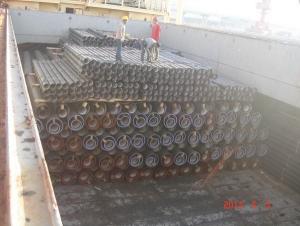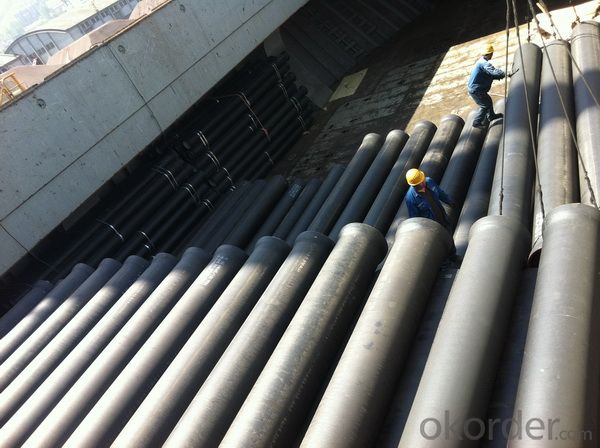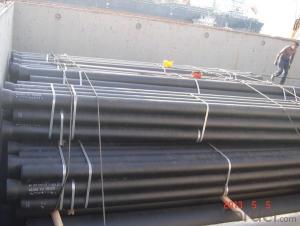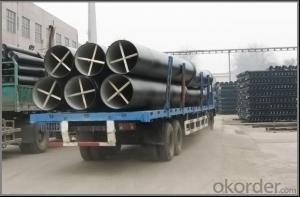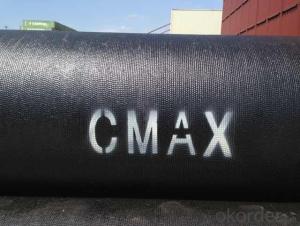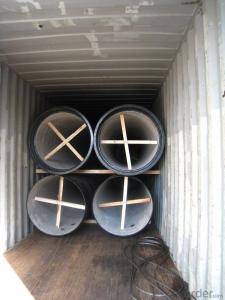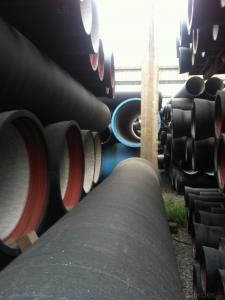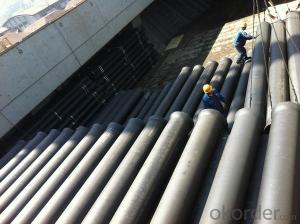DUCTILE IRON PIPE DN400 K7 CLASS
- Loading Port:
- Tianjin
- Payment Terms:
- TT OR LC
- Min Order Qty:
- -
- Supply Capability:
- 30000Tons m/month
OKorder Service Pledge
OKorder Financial Service
You Might Also Like
CNBM ductile iron pipe ranges from DN80-DN1600mm (T-Type, Class K9), effective length 6m, comply with ISO2531 Standard
Company Profile
CNBM International Corporation is the leading production base and renowned supplier of Ductile Iron Water Pipe systems of both potable and waste water in China. We are constantly looking to develop high quality products to ensure the longest service life and wonderful performance.
CNBM Pipelines regard quality as the essential factor leading to successful business. Every pipe is tested in accordance with BS EN545 (water application) or BS EN598 (sewer application). CNBM Pipelines products comply with and are tested according to the relevant European and International Standards. Our pipes are manufactured under the quality management system BS EN ISO 9001. After years of efforts, CNBM Pipelines has built up great reputation in terms of quality and service among customers worldwide
Product Introduction
CNBM ductile iron pipe ranges from DN80-DN1600mm (Tyton, T-Type, Class K7/K8/K9), effective length: 6m, complying with BS EN545/EN598/ISO2531/BS4772.
Specification& Payment terms
Internal lining: Pipes shall have an internal cement mortar lining in acc with ISO4179.
External coating: Pipes shall be externally coated with metallic zinc spray plus a further layer of resin painting to ISO8179.
Gasket: 100% SBR/NBR/EPDM gasket in accordance with ISO4633.
Packing: Pipes from DN100 to DN300 be bundled with steel belts, the others are in bulk.
Payment term: By 30% T/T advance payment + 70% Irrevocable L/C at sight.
Packing: In bulk vessel or in container.
- Q: Do ductile iron pipes require additional protection against external factors?
- It is necessary to provide extra protection for ductile iron pipes due to external factors. Despite being strong and durable, ductile iron pipes are susceptible to corrosion and other threats that can cause pipe failure. The primary external factor that ductile iron pipes require protection from is corrosion. Corrosion can weaken the pipe over time and is caused by certain chemicals present in soil or water. To prevent corrosion, ductile iron pipes are often coated with substances like polyethylene or zinc. This coating acts as a barrier, safeguarding the pipe against corrosive elements and prolonging its lifespan. In addition to corrosion, ductile iron pipes may also need protection against physical damage. These pipes are typically buried underground, making them vulnerable to forces like heavy machinery, ground movement, and vandalism. To protect against physical damage, ductile iron pipes can be encased in concrete or surrounded by a protective sleeve or casing. Furthermore, ductile iron pipes may require protection against soil conditions that can lead to pipe movement or shifting. In areas with unstable soil, it may be necessary to implement measures such as proper bedding and backfilling techniques, as well as the use of anchoring devices. These measures ensure the stability and integrity of the pipes. To conclude, although ductile iron pipes are strong, they still need additional protection against external factors. This includes preventing corrosion, protecting against physical damage, and addressing soil conditions. By implementing these protective measures, the lifespan and performance of ductile iron pipes can be significantly extended, ensuring the reliable transportation of water and other fluids.
- Q: How does ductile iron pipe perform in areas with high soil erosion?
- Ductile iron pipe performs well in areas with high soil erosion due to its inherent strength and durability. Its thick walls and strong composition make it resistant to external pressures, including the erosive forces of soil. The pipe's ability to withstand the effects of soil erosion helps ensure its long-term performance and reliability in such challenging environments.
- Q: How long is the service life of the cast iron pipe, and the time of use of ductile iron pipes?
- When it comes to the service life of nodular cast iron, its maintenance is essential for its long service life. Then, the focus of the maintenance of ductile iron pipe is to pay special attention to, will affect the long-term use of ductile iron pipes, stable operation of socket, row, etc., we should make efforts to these aspects of the mouth without debris. Make sure that the rubber ring of the ductile iron pipe has been smashed with a rubber hammer, and it is not twisted or twisted, and it is uniformly stuck in the slot. Ductile iron pipe in the maintenance process, because of the pneumatic tube axis is buried into the ground, so in the face of a tilt angle of the time, we must be careful, if the resistance is too large, will not force the excavation, in order to prevent the distortion of the rubber ring.
- Q: Are there any specific standards or specifications for ductile iron pipes?
- Ductile iron pipes have specific standards and specifications that must be adhered to. The American Water Works Association (AWWA) and the International Organization for Standardization (ISO) are responsible for establishing the most commonly used standards for these pipes. AWWA has developed the AWWA C151 standard, which covers everything from design and manufacturing to testing, installation, and maintenance requirements for ductile iron pipes used in water and wastewater applications. This standard outlines the materials, dimensions, and mechanical properties of the pipes, as well as the necessary coatings and linings. Similarly, ISO has created the ISO 2531 standard, which provides guidelines for the design, manufacturing, testing, and installation of ductile iron pipes in water and wastewater systems. This standard addresses various aspects, including dimensions, mechanical properties, coatings, and linings. In addition to these well-known standards, there may be other regional or national standards that are specific to certain countries or regions. These standards typically align with the AWWA and ISO standards or may have additional requirements that are specific to local conditions or regulations. Compliance with these standards ensures that ductile iron pipes meet the required quality and performance standards. It also promotes the interoperability and compatibility of ductile iron pipes across different systems and countries, which in turn enables reliable and efficient water distribution and wastewater management.
- Q: Can the sealing ring of ductile iron pipe be reused?
- It is better not to have used things, easy aging, sealed, the best to use new
- Q: What if the ductile iron pipe is broken?
- Ductile iron pipe rupture can be repaired by using a cast iron defect repair machine, that is, a cast iron defect repair device. However, the general use of iron defects repair equipment can be repaired welding, and will not affect its use. Ductile iron pipes are used for water supply, so if it breaks, it will not be easy to handle. Make sure that the main valve is closed and repaired.
- Q: How does ductile iron pipe compare to PVC pipe in terms of strength?
- Generally, ductile iron pipe is considered stronger than PVC pipe due to its composition of iron and carbon, which provides it with high tensile strength and resistance to breakage. It is commonly utilized in heavy-duty applications like water mains, sewer lines, and industrial piping due to its ability to withstand high pressures. On the flip side, PVC pipe is manufactured using a plastic material known as polyvinyl chloride. While PVC pipe is lightweight and easy to handle, it lacks the strength of ductile iron pipe. It is typically used in low-pressure applications such as household plumbing, irrigation systems, and drainage pipes. When comparing the strength of ductile iron pipe to PVC pipe, the former has a greater capacity to handle heavy loads, endure ground movement, and resist damage from external factors like rocks or tree roots. Additionally, ductile iron pipe is more durable and has a longer lifespan in comparison to PVC pipe. However, it is important to consider that the choice between ductile iron pipe and PVC pipe ultimately depends on the specific requirements of the project. Factors such as cost, environmental conditions, ease of installation, and desired longevity should all be taken into account when determining the appropriate type of pipe to utilize.
- Q: Can ductile iron pipes be used for rainwater harvesting systems?
- Yes, ductile iron pipes can be used for rainwater harvesting systems. Ductile iron pipes are known for their durability and strength, making them suitable for various applications, including rainwater harvesting. These pipes are resistant to corrosion and can withstand high pressure, which is essential for transporting rainwater from the collection point to storage tanks or distribution systems. Additionally, ductile iron pipes have a long lifespan, reducing the need for frequent replacements and making them a cost-effective choice for rainwater harvesting systems.
- Q: How does ductile iron pipe handle ground movement and settlement?
- Ductile iron pipe is highly resilient and can effectively handle ground movement and settlement. Its flexibility and strength allow it to withstand external loads and pressure variations caused by ground shifts and settlement. The pipe's inherent ability to absorb and distribute stress ensures its stability, minimizing the risk of damage or failure due to ground movement. Additionally, ductile iron pipes are commonly installed with flexible joints that further accommodate ground shifts, providing a reliable and durable solution for underground applications.
- Q: Are ductile iron pipes suitable for use in oil refineries?
- Yes, ductile iron pipes are suitable for use in oil refineries. They have excellent corrosion resistance and high tensile strength, making them ideal for transporting various fluids and gases in harsh environments such as oil refineries. Additionally, their flexibility and durability allow for easy installation and maintenance, ensuring reliable operations in refinery facilities.
Send your message to us
DUCTILE IRON PIPE DN400 K7 CLASS
- Loading Port:
- Tianjin
- Payment Terms:
- TT OR LC
- Min Order Qty:
- -
- Supply Capability:
- 30000Tons m/month
OKorder Service Pledge
OKorder Financial Service
Similar products
Hot products
Hot Searches
Related keywords
